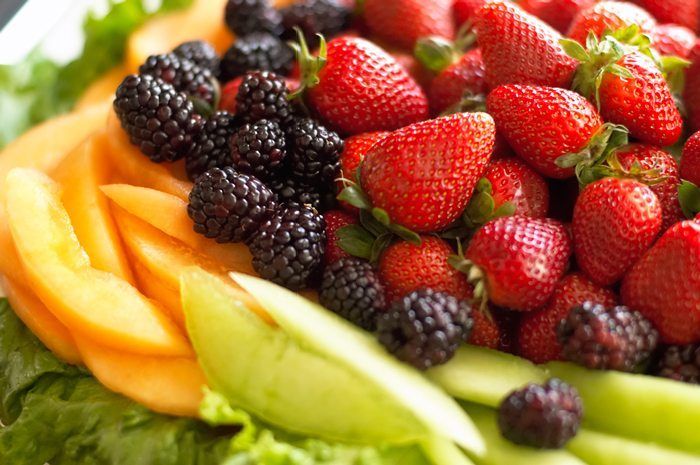

How to Improve Nutrition During Cancer Treatments
I personally have been involved with charities that specifically relate to Cancer for over a decade now. With that in mind and the fact the my friend Ben Mena has taken on a challenge with the The Little Things for Cancer and created a team to run the Marine Corps Marathon, I thought this would be an appropriate time to incorporate a guest post by my friend David Haas. His bio is at the bottom of the post, but he is very active in creating awareness and outreach for Mesothelioma. Enjoy this great article and pass it on to anyone you know that cane be of benefit. Carpe Viam!
How to Improve Nutrition During Cancer Treatments
Nutrition plays an important role in helping to prevent many types of cancers, but it also plays a major role for those going through cancer treatments and therapies. Eating the right foods can help you maintain your energy levels, gain needed strength to go through treatment and improve your quality of life. However, vicious side effects such as nausea, loss of appetite and extreme fatigue can seriously affect your ability to eat.
Learning how to side step these problems and improve your nutrition can make cancer treatments easier to handle.
Nausea
Common cancer therapies such as surgery, radiation or chemotherapy often result in nausea. Since weight loss can lower immune system function, sap your strength, and lower your vitality, it’s particularly important to learn how to improve your nutritional condition when nauseated.
Start by eating smaller meals more frequently throughout the day. Sipping carbonated beverages, using foods or drinks that contain ginger; sipping clear soups and avoiding spicy foods can also help. It’s also important to stay hydrated, so focus on foods that contain plenty of liquids such as puddings, custards and creamy soups.
Loss of Appetite
The stress and emotional upheaval that comes with a cancer diagnosis can seriously affect your desire to eat. Uncertainty, fear of the unknown and strained family relationships only adds to the burden. Even if you don’t feel hungry, it’s important to eat a balanced diet that’s high in protein, fruits and vegetables. The University of Arizona Cancer Center suggests you take advantage of the time of day when your appetite is best.
Focusing on higher calorie foods for both meals and snacks will help because you won’t need to eat as much volume. Try adding fortified protein powders to milkshakes, snack on cheese and nuts, and add sauces or extra fats to your vegetables. Making sure you exercise everyday can also help to increase your appetite.
Fatigue
When you’re tied and worn out due to anxiety, medication, or treatment, poor nutritional practices only makes the depression or dragged out feeling worse. Getting plenty of liquids, exercise, and nutrient-dense foods in the form of colorful fruits and vegetables are important to keep the fatigue from getting you down.
While some causes of fatigue from cancers can’t be avoided, like the symptoms of mesothelioma, make sure you’re eating plenty of iron-rich whole-grain cereals, getting adequate sleep and eating enough protein foods such as eggs, beans and dairy. While paying attention to nutritional details can feel like it’s more trouble than it’s worth, keeping your nutritional intake high during cancer treatments can give you that extra edge you need to survive.
David Haas
Joining the MCA in 2011, David Haas is the Director of Awareness Programs. In addition to researching much of the information available to our site’s visitors, David often blogs about programs available and campaigns underway at the Mesothelioma Cancer Alliance. David is a fitness enthusiast who frequently runs, climbs, and bikes for enjoyment. He is also very involved in outreach associated with awareness about the dangers of asbestos for many different organizations and groups of people.
to researching much of the information available to our site’s visitors, David often blogs about programs available and campaigns underway at the Mesothelioma Cancer Alliance. David is a fitness enthusiast who frequently runs, climbs, and bikes for enjoyment. He is also very involved in outreach associated with awareness about the dangers of asbestos for many different organizations and groups of people.
Read more: http://www.mesothelioma.

The Importance of Nutrition In Fitness
~This is a guest post by a friend of mine, Dr. Karen Danish, LAP ~Enjoy!~
It’s difficult to talk about nutrition without fitness, and fitness without nutrition. They go hand-in-hand, and help balance each other out, creating a healthy body and mind. Proper nutrition fuels the muscles to help us power through not only tough workouts but our day-to-day activities. Nutrition, by definition, is a process the body uses to digest food and use it for energy, growth and development. Fitness describes our body’s ability to process energy in the most efficient way possible. It covers a wide range of topics including endurance, body composition, strength and flexibility. Without proper nutrition, our bodies have the inability to work on fitness levels. See? You just can’t talk about one without the other. Here, we’ll talk a little bit more about how nutrition helps your fitness, how a lack of nutrition hurts it, and why exercise alone isn’t enough.
Have you ever heard, “You are what you eat?” It’s true, especially when discussing nutrition and fitness. And it’s pretty simple. Eating bad food makes you feel bad, and eating lots of good food makes you feel really good. Foods that are packed with vitamins, nutrients and are more natural are better for you and your body. Higher calorie, processed foods take a toll on your body and daily routine. Foods higher in nutrients give you energy, keep you focused on work or chores, and a healthy diet can promote good health habits in all areas of your life. When you eat right, your body works more efficiently, giving you the energy to exercise and keep up your fitness routine.
You know that good foods make you feel and look good, so why do bad foods hurt your fitness? Things on the outside might look ok with a poor diet, but on the inside, blood sugar levels are adversely affected, cholesterol levels can skyrocket, major damage can be done to the heart, and your digestive tract will not work as efficiently. Your motivation to keep up a healthy exercise routine will take a hit as well. You won’t have enough energy to make it a priority. It’s just a fact: you cannot out-exercise a bad diet.
Many people think that even if we don’t maintain a perfect – or even great – diet, we can hit the gym and still maintain a healthy body. This is not only wrong, but dangerous. If you load up on unhealthy, sugar-laden foods then head to the gym for an intense workout, it spells trouble. Eating foods that are packed with nutrients are better for powering a workout and helping you sustain your fitness level. The wrong kind of fuel will cause an inevitable breakdown at some point. Your body needs and deserves the right kind of energy, which is important to an active lifestyle.
It’s simple: nutrition and fitness go together. Always. Your body needs a healthy diet in order for it to what you want it to do efficiently. Consult a doctor or dietitian with specific questions about what you should be taking in to support your fitness routine.

This post was written for IronGoof, by Karen Danish, LAP. Karen is a licensed acupuncture physician and a valued staff member at Anne Hermann MD, PA, St. Petersburg Weight Loss Clinic.




